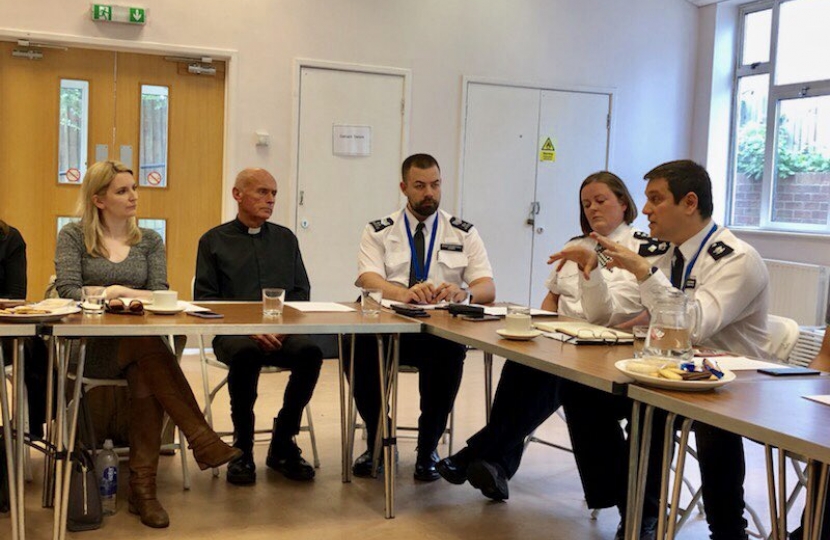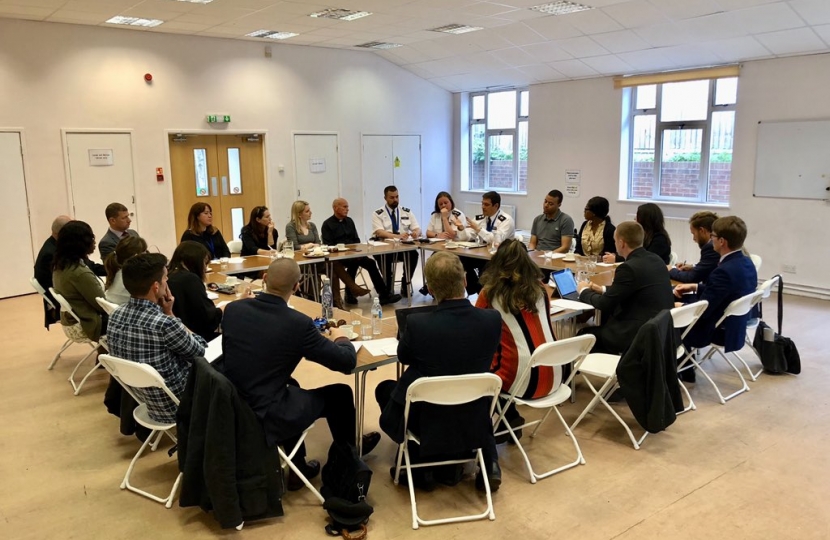Today my team and I brought together community representatives, police and Havering council at a meeting in Harold Hill to encourage a joined-up approach to preventing and tackling violent crime in the borough.
Held in St George’s Church on Chippenham Road courtesy of Rev Shaun Moore, the meeting aimed to connect those voluntary organisations and residents who had approached me about youth violence into police and council work already underway. I also invited representatives from specialist youth groups, local primary and secondary schools, and Havering College and Sixth Form College, to ensure that issues of exclusions, after-school safety, adverse childhood experiences and deprivation featured in discussions.
The meeting provided an opportunity for new BCU Police Commander, Stephen Clayman, to set out his previous experience in Trident and community policing, and the work of borough police in tackling the county lines drug trade. Neighbourhoods Inspector, Lisa Butterfield, shared the work of her ward teams in protecting residents against violent crime. The Met is working intensively to recruit more police officers and crime analysts, and £20 million of additional funding has been made available since the Chancellor’s Spring Statement to tackle knife crime.
Parenting support for those youngsters most at-risk of gang involvement formed a key part of the roundtable. Harold Hill mum, Peguy Kato, shared her experiences of losing her son, Champion, to knife crime and talked of the charity she will soon be launching in his name, while Bolaji Olagunju set out the services available to parents and teenagers from her Hornchurch charity, You and Me Counselling. Members of faith communities also offered their support to borough initiatives, and Rachel Grimwood of Harold Wood talked about the Ingrebourne Centre which is being established as a community hub and safe place for young people.
The meeting followed work in parliament with Home Office Ministers, Nick Hurd and Vicky Atkins, who are leading the government initiative to crack down on serious violence. At a meeting on 4 June they highlighted a new county lines coordination centre and the legal duty that will be underpinning the public health approach to violent crime. They set out how the £100 million granted in the Spring Statement is being spent, including on increased police operations in those areas most affected by violence, £35 million towards Violence Reduction Units and £1.6 million to ensure data sharing is improved. Following the Prime Minister's summit on serious violence in April, a new ministerial taskforce has been established with a team sitting within the Cabinet Office to drive outcomes.
We were joined at the ministerial meeting by Jackie Sebire who is the national police lead for serious violence. Jackie outlined some of the major police operations underway, including Operation Sceptre which has seen the seizure of 10 000 weapons. A firearms amnesty is planned for July to build on that work. However, she also expressed her disappointment that there remains a 19 per cent failure rate of shops selling knives to underage children. Meanwhile, she set out how serious violence units are spearheading work on looked-after children, stop and search, enhanced suppression of individuals and groups involved in gangs, and some of the work between police and the National Crime Agency to tackle the organised drugs trade. Stop and search has also been substantially stepped up, with police much more confident about using this tactic now that body-worn cameras have driven down complaint rates.
We also heard from Dr Eamonn O'Moore who is spearheading the public health approach to driving down crime, which looks at how adverse childhood experiences and troubled family relationships can be a driver behind those who find themselves vulnerable to gang recruitment or who perpetrate violent crime themselves. Ministers highlighted the Youth Endowment Fund to which local groups can bid if they need to fund work with young people.
Preventing and tackling violent crime is a top priority for all of us in the borough, but we will be most effective if we act as a team. While Havering still has comparatively low rates of violent crime, this makes incidents like the senseless murder of Jodie Chesney all the more shocking. Both before and after that tragedy, I have been approached by local people wanting to get involved in the effort to keep our borough safe and it has been clear to me that while there is huge willingness among all parties, we could all be working together more effectively – whether that is through data sharing, increased support to at-risk youngsters or improved dialogue with isolated parents. Policing, deterrence and punishment will always form a key part of tackling violence, and I have successfully made the case to government for extra resource and increased use of stop and search. But police officers cannot do everything, and in involving all parts of the community in the public health approach to violent crime, we stand a better chance of preventing tragedies in the first place. I thank everyone who participated in my Harold Hill meeting and am excited to see that those who attended the meeting are already connecting with one another independently to see where their work crosses over.



